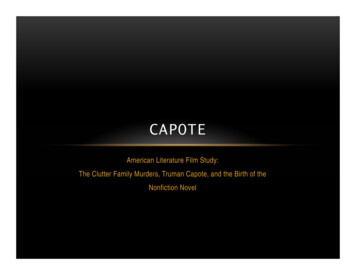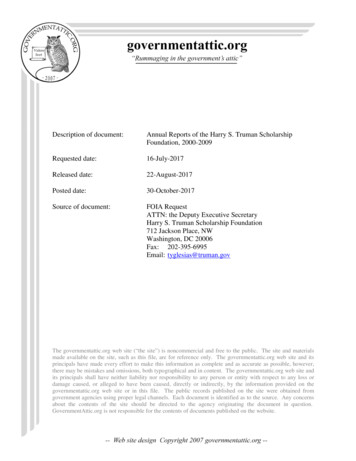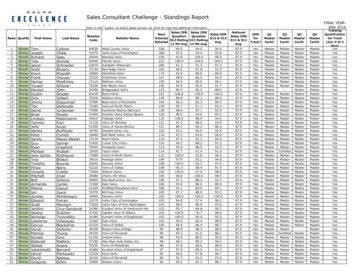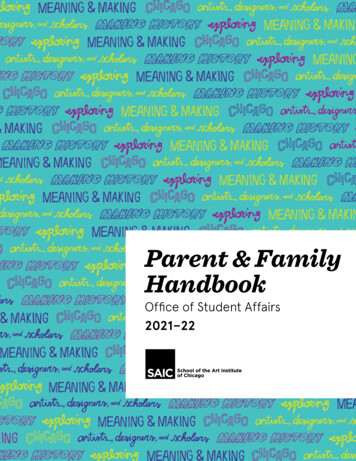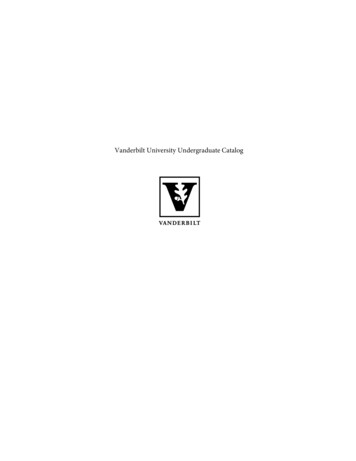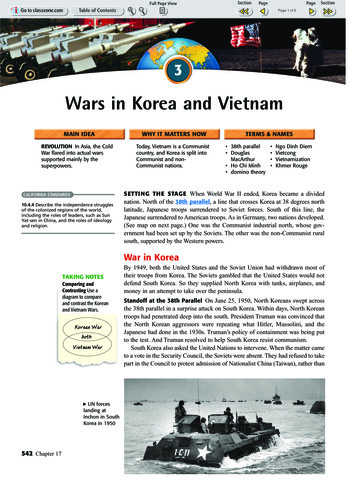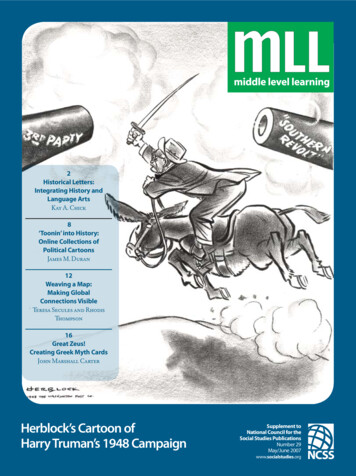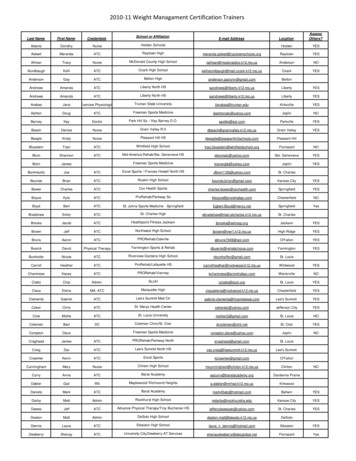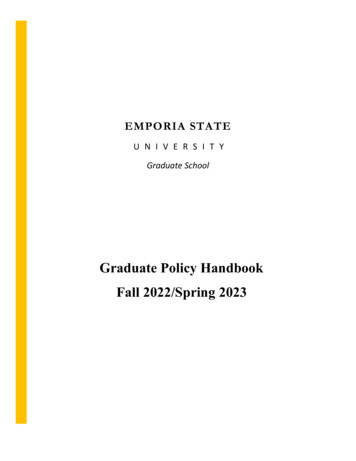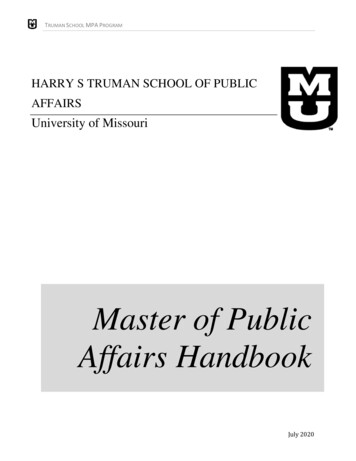
Transcription
TRUMAN SCHOOL MPA PROGRAMHARRY S TRUMAN SCHOOL OF PUBLICAFFAIRSUniversity of MissouriMaster of PublicAffairs HandbookJuly 2020
MPA STUDENT HANDBOOK, 2020 – 20211PREFACEThis handbook is designed to provide students with information necessary for the completion of theMaster of Public Affairs degree offered by the Harry S Truman School of Public Affairs. This handbook doesnot include information about all of the Office of Graduate Studies’ requirements and is designed to beused in conjunction with other MU publications, including the M-Book, the Graduate Catalog, and myZou.Harry S Truman School of Public AffairsAcademic Programs Office101 Middlebush HallColumbia, Missouri 65211Phone: (573) 884-1656Fax: (573) 884-4872E-mail: truman@missouri.eduWeb: truman.missouri.eduThe MPA program at the Truman School is accredited by the Network of Schools ofPublic Policy, Affairs, and Administration, the membership association of graduateprograms in public administration, public policy and public affairs. NASPAAaccreditation signifies that a master's program in public affairs and administration has gone through arigorous process of voluntary peer review conducted by the Commission on Peer Review andAccreditation (COPRA), and has met NASPAA's Standards for Professional Master's Degree Programs inPublic Affairs, Policy and Administration.“I found that the men and women who got to the top were those who did the jobs they had inhand, with everything they had of energy and enthusiasm and hard work.”—Harry S Truman
TRUMAN SCHOOL MPA PROGRAM2TABLE OF CONTENTSPreface. 1Table of Contents . 2TSPA Mission . 3Values . 3Master of Public Affairs Overview . 4MPA Program Options . 5Online Courses . 6Admissions . 7Transfer of Credit . 8Fees and Financial Aid . 9Advising . 9Coursework and Sequencing . 9Areas of Specialization . 10The MPA Internship. 12Graduate Certificates. 13Dual Degree Options. 13Public Affairs Course Descriptions . 13Registration. 14Email Accounts . 14Graduation . 14Career and Alumni Services . 15Academic Integrity . 15Grievance Policy . 18University Regulations . 19Appendix I: NASPAA Member Code of Good Practice . 21Appendix II: Public Affairs and Student Organizations . 22Appendix III: Contact Information . 23Appendix IV: Student Resources . 24
MPA STUDENT HANDBOOK, 2020 – 20213TSPA MISSIONTo advance the study and the practice of governance in Missouri, the nation, and beyond by conductingscholarly research, informing governance and public policy, educating for ethical leadership in publicservice, preparing the next generation of scholars, and fostering democratic discourse among citizens,policy makers, and scholars. Conducting Scholarly ResearchScholarly research and the production of knowledge are central to the work of the Truman School. Acrossdiverse areas of scholarship, our faculty, staff, and students make important contributions to theory andpractice. Informing Governance and Public PolicyPublic policy makers confront increasingly complex, challenging, and contentious issues. Throughscholarly and applied research, policy analysis and program evaluation, policy forums and other outreachprograms, the Truman School helps to bring the knowledge and expertise of MU faculty directly to policymakers. Educating for Ethical LeadershipEducation for ethical leadership in public service encompasses professional development and continuingeducation, graduate certificates and advanced degrees. Our graduates apply their knowledge and skills tothe critical challenges facing the public, private, and nonprofit sectors. Preparing the Next Generation of ScholarsThe Truman School’s Ph.D. program in public affairs is designed to train interdisciplinary scholars forpositions in academic and research institutions. Fostering Democratic DiscourseThe Truman School provides a meeting ground for policy makers, community members, scholars, andstudents to engage issues of public affairs. Community forums, round-tables, lectures, and other civicevents facilitate public dialogue.VALUES KnowledgeWe have a duty to acquire, create, transmit, and preserve knowledge, and to promote understanding ofpublic policy, public administration, and public affairs. Within our diverse disciplines, we seek to useknowledge to advance public service and help to develop an active citizenry. RespectRespect for self and others is a hallmark of the Harry S Truman School of Public Affairs. As members of anacademic community, we respect the process by which truths are sought. Such respect is essential fornurturing the trust, collegiality, and creative expression that characterizes the School. Respect isdemonstrated by a commitment to act ethically, to welcome difference, and to engage in free and openexchanges about both ideas and actions. Student-CenteredWe believe that the education and professional development of students are central to our mission. Weare committed to their intellectual, professional and civic development, and their active engagement inour learning community.
TRUMAN SCHOOL MPA PROGRAM4 Responsible ChangeOur professional efforts in teaching, research, and public service are dedicated to the process ofresponsible change in institutions devoted to enhancing the quality of life of all citizens. Public ServiceWe believe that public service is the central mission of government, and that governments are necessaryand beneficial institutions in our society. Governments at all levels arbitrate conflicting interests, deliverselected goods and services, and enhance the quality of life. Likewise, nonprofit organizations and someprivate organizations work to advance public service. Social CapitalSocial capital is the collective product of committed, active citizens and the currency of our publicinstitutions and our common will. We are committed to working to foster better relations between ourinstitutional environment and others in public service, helping renew the social capital needed in ourdemocratic society. Building Democratic GovernanceWe believe that democratic governance requires reflective and knowledgeable citizens who participateactively in public issues. We have a three-fold responsibility in this regard: first, to disseminate publicaffairs knowledge to the public; second, to serve as a convener of public policy dialogue and discussion;and third, to provide public policy-relevant research for communities and decision makers. Partners in Public ServiceWe consciously choose to engage with external partners to enhance the public good. Thus, we seek tonurture appropriate relationships with those organizations and individuals in the public, nonprofit, andprivate sectors who value the ideals of public service. Our role is to provide relevant, research-basedknowledge, policy analysis and evaluation, training, and technical assistance. Carrying out our roleresponsibly requires consideration of the intended as well as unintended consequences of public action.MASTER OF PUBLIC AFFAIRS OVERVIEWThe mission of the Truman School’s MPA Program is to prepare a diverse student body for ethicalleadership in the public, nonprofit, and private sectors. The MPA program draws upon theinterdisciplinary teaching, research and public service capacity of the Truman School to provide studentswith a range of perspectives and experiences that promote public service values and democraticdiscourse. Through their coursework, students build knowledge of policy processes and managementprinciples and develop critical thinking and analytic skills that enable them to advance in careers in arapidly changing public service.Goals:1.2.3.Offer a comprehensive set of core and specialization courses that build a strong theoreticalfoundation in public affairs, policy, and management, develop rigorous analytic skills, andprovide opportunities for practical application of knowledge, skills, and competencies tosignificant public policy and management issues.Ensure students gain hands-on experiences and engage with public and nonprofitorganizations as an integral part of the program.Promote public service values across the curriculum and provide opportunities forexperiential application of these values.
MPA STUDENT HANDBOOK, 2020 – 20214.5.5Promote a respect for diversity by exposing students to national and international scholars,governmental and nonprofit leaders, and students from various countries who exemplifypublic service values.Provide students with the skills to critically analyze, evaluate, propose, and facilitate solutionsthat address the dynamic challenges facing the public, private, and nonprofit sectors.The Truman School Master of Public Affairs program provides a mix of theory and practical knowledge,helps students develop analytic and research skills, and provides opportunities for hands-on learning. Arigorous set of core courses are complemented by professionally relevant areas of specialization in publicpolicy and management. This combination ensures that MPA graduates are well prepared for leadershipand policy roles in the multi-sectored public service.In the Truman School MPA Program, students study with outstanding faculty, well-known for theirexcellent research and teaching, and deeply committed to the ideals of public service. MPA facultymembers are talented teachers as well as active, nationally prominent researchers. They take a great dealof interest in students and are readily available for personal interaction.Students come to the Truman School from across the United States and around the world, making thestudent body a diverse group of individuals seeking to broaden their perspectives and to sharpen theirskills. Graduates understand the challenge, anticipate the excitement, and accept the responsibility thatcomes with today’s dynamic public service.Interaction among academics, students, and those engaged in public policy making and administrationsupports our educational mission. Policy forums, roundtables with policy makers, lectures bydistinguished visiting scholars, and research symposia enrich our learning community.MPA students are encouraged to join various professional and on-campus organizations dedicated to thefield of public policy and administration. The American Society for Public Administration (ASPA) and theAssociation for Public Policy and Management (APPAM) allow students the chance to share ideas anddevelop relationships with scholars and practitioners in public policy and administration. The Associationfor Mizzou Public Affairs Students (AMPAS), established and managed by MPA and PhD students on theColumbia campus, engages in a wide variety of activities, including information on job contacts andplacement, professional organizations, speakers, social programs, peer-advising, fundraising events, andservice learning.MPA PROGRAM OPTIONSThe Harry S Truman School of Public Affairs offers two MPA options designed to meet the needs of bothpre-service students and mid-career professionals.Early Career Program (36 credits)This option is available to students lacking at least 3 years of progressively responsible work experiencein public service oriented jobs. This program incorporates 6 credit hours of experiential learning in theform of a 3-credit internship and a 3-credit capstone.Mid-Career Program (30 credits)This option is available to students with 3 to 5 years of progressively responsible, post-baccalaureate workexperience in public service. Applicants are required to write an essay describing how their professional
TRUMAN SCHOOL MPA PROGRAM6experience relates to public affairs and how they have progressed in the field. The internship and capstoneclasses are waived for the mid-career program.ModalitiesBoth the early career and mid-career programs are offered in two modalities, on-campus and online. On-campus: Classes are held on the MU campus in Columbia. Many core courses are offered inthe mornings, later afternoon from 3 to 5:30 p.m. or from 6 to 8:30 p.m. during the regular 16week fall or spring semester, at least one time each year. Online: Classes are held in an asynchronous format using the Canvas learning managementsystem. Students in the online program may take classes on-campus as their schedule permits.Changing Your Program OptionIn exceptional circumstances, Early Career students who wish to switch to the Mid-Career Program mustwrite an essay (up to 400 words) describing how they meet the minimum three years of progressivelyresponsible experience related to public affairs. This experience must have been acquired prior tomatriculating into the MPA program.ONLINE COURSESEnrollment PolicyStudents who are admitted to an online modality will have the first option to register for the onlinecourses during the initial enrollment period (registrar opens the courses for enrollment). Other studentswill be allowed to register for the course if space is still available in MyZou once the restriction is liftedduring the final enrollment period (up to two weeks before the semester begins).Students in On Campus Modality:midEnrollment in Online Courses1. Students enrolled in the on-campus modality will not be allowed to take an online course in theirfirst semester.2. Students enrolled in the on-campus modality will be allowed to register and enroll in no morethan three elective online courses (from any department) and one MPA core course during theirprogression through the MPA program for a maximum of four courses (12 credit hours). Studentsmust receive pre-approval and can register for these online courses as space permits.Students in Online Modality: Enrollment in On-Campus CoursesStudents enrolled in the online modality will be permitted to take face-to-face classes in Columbia withouta petition process provided they meet any required prerequisites and space is available.
MPA STUDENT HANDBOOK, 2020 – 20217Graduate Certificates and MPA courseworkStudents enrolled in an MPA degree program can apply online courses to the certificate programs withinthe guidelines established above (up to three electives from any department and one core course online).MPA students will be required to take, at minimum, three additional credit hours beyond therequirements for their specific MPA option in order to complete a graduate certificate offered throughTSPA.Non-Public Affairs Graduate Student Enrollment in MPA Online CoursesStudents who are not enrolled in any of the MPA degree programs or graduate certificate programs canregister for the online courses, space permitting. If these individuals later apply and are admitted to oneof the MPA degree programs, their online classes will count toward the MPA degree.Note: Enrollment in the online courses will be managed through enrollment caps and restrictions as listedabove. As space is available, non-MPA / non-Certificate students can enroll in courses with the instructor’spermission. This includes (1) non-degree seeking students (2) students in another on-campus Master’sprogram, or (3) students in another online graduate program. In cases where the Truman School hasagreements with other online programs (such as the online MPH), these students will be allowed toregister per prior arrangements between the programs.On-Campus International StudentsPer University policy, an international student may only count three credit hours of online courseworktoward full-time enrollment requirements each semester.ADMISSIONSOur objective is to select a diverse group of students with academic ability and potential for career growthwho are committed to public service. MPA candidates seeking admission must meet the University’sminimum quantitative requirement of a grade point average of at least 3.0 in all upper division work (last60 undergraduate hours).All non-native-English-speaking applicants are required to provide proof of English language ability, perthe Graduate School's policy.All applicants must submit an Office of Graduate Studies application and official copies of all transcriptsto the University of Missouri Office Of Graduate Studies. Additionally, a resume, statement of interest,and three letters of recommendation should be submitted electronically through the Office of GraduateStudies online application system. Students who have taken classes within the past 5 years are stronglyencouraged to submit at least one letter of recommendation from a faculty member who taught thestudent in class. In addition, applicants to the mid-career program must submit a statement of careereligibility.Some students who do not meet the minimum university qualifications attempt to prove their ability todo graduate work by enrolling as post-baccalaureate, non-degree-seeking students. Students who choosethis route should have a cumulative grade point average of at least 3.0 for all graduate work undertakenat the University. Students are forewarned that successful completion of graduate-level courses does notguarantee admission to the MPA program. A maximum of 12 credit hours taken as a post-baccalaureatestudent can be transferred into the MPA program if and when the student is admitted.
TRUMAN SCHOOL MPA PROGRAM8TRANSFER OF CREDITNo more than 20% of the credits that comprise a student’s program of study may be transferred fromanother program or institution, including another campus of the University of Missouri system. To transfercredits, students must have received a grade of B- or higher in the course, and must have the approval ofthe MPA Committee and the Office of Graduate Studies.A student requesting a credit transfer must have been enrolled as a graduate student at the university orcampus while taking these classes; in other words, transfer credit will not be given for graduate coursestaken while the student was an undergraduate or had not been accepted as a graduate student at theother university or campus. A student who has completed one master’s degree at MU or elsewhere may,upon approval, apply a maximum of eight hours of credit earned in the previous program toward theMPA. A student may pursue two master’s degrees simultaneously, but no more than eight hours of creditmay be applied to both options, with the exception of approved dual degree programs (see Dual DegreeOptions for more information).Students must seek prior approval if they plan to take a course elsewhere and apply it to the MPA degree.If a student would like to request a waiver or substitution of one of the MPA courses, he or she must firstconsult with the Academic Programs Office.
MPA STUDENT HANDBOOK, 2020 – 20219FEES AND FINANCIAL AIDTuition and fees information is available at https://cashiers.missouri.edu/cost/. Many students at theTruman School receive financial assistance through research assistantships, graduate fellowships, orstudent loans.Students must remain in good standing in order to retain funding. Additional funding opportunities maybe available and students are encouraged to contact the Academic Programs Office for more information.Students interested in fellowship or assistantship opportunities must complete the application process byJanuary 15. For more information about financial aid, contact the Office of Student Financial Aid at 573882-7506 or visit sfa.missouri.edu.ADVISINGEach MPA student is assigned a faculty mentor prior to enrolling in the program. Students work with theirfaculty mentors to determine a specialization and discuss internship and career opportunities (see alsoCareer and Alumni Services). Faculty members are available to advise students on the substance andcontent of their course work. Academic advising, course planning, and course permissions are theresponsibility of the Academic Programs office, which helps students plan their course of study to meetgraduation requirements.COURSEWORK AND SEQUENCINGMPA: Early Career ProgramThe Early Career Program requires thirty-six credit hours to fulfill the requirements of the degree. Thecore courses provide a common body of knowledge for all students and serve as a foundation for coursesin the areas of specialization. All students are required to take these courses in order to acquire a generalunderstanding and appreciation for the scope of public affairs.MPA Core—7 core courses (21 credit hours) PA 8110: Public and Nonprofit Management (3 credits) PA 8170: Public Policy Processes and Strategies (3 credits) PA 8180: Research Methods and Inquiry in Public Affairs I (3 credits) PA 8181: Research Methods and Inquiry in Public Affairs II (3 credits) PA 8210: Democracy and the Public Service (3 credits) PA 8280: Internship (3 credits) PA 8211: Capstone (3 credits)Area of Specialization—5 elective courses (15 credit hours)Total: 36 credit hours
TRUMAN SCHOOL MPA PROGRAM10Nine to twelve graduate credit hours (three or four 3-hour courses) is considered a full-time graduate loadper semester in Columbia.Exemption for PA 8180* If a student has taken undergraduate courses that cover the material in PA 8180,the student can request a course exemption from the instructor and substitute another more advancedstatistics course. The instructor of PA 8180 can recommend alternatives.MPA: Mid-Career ProgramThe mid-career program requires thirty credit hours to fulfill requirements for the degree. Students in themid-career program complete an MPA Core of five courses, and 15 hours of electives.The internship requirement (PA 8280) and the Capstone applied project (PA 8211) are waived for MidCareer students. The Public Management area of specialization is offered online. The Public Policy areaof specialization requires coursework that is only offered on campus in Columbia. Students wishing topursue the Public Policy specialization should notify the Academic Programs Office upon admission to theprogram. The Public Policy specialization is not available for online students at this time.MPA Core—5 core courses (15 credit hours) PA 8110: Public and Nonprofit Management (3 credits) PA 8170: Public Policy Processes and Strategies (3 credits) PA 8180: Research Methods and Inquiry in Public Affairs I (3 credits) PA 8181: Research Methods and Inquiry in Public Affairs II (3 credits) PA 8210: Democracy and the Public Service (3 credits)Area of Specialization— 5 elective courses (15 credit hours)Total: 30 credit hoursAREAS OF SPECIALIZATIONThe purpose of an area of specialization is to provide the student with advanced education and trainingin a substantive field or functional area of professional interest. Students will be able to select 5 electivecourses in consultation with their faculty mentor and academic advisor to reflect this focus and craftthe course of study best suited to their career goals. Students are not restricted to only selecting electivesfrom one specialization.Areas of Specialization include: Public Management Nonprofit Management Public PolicyPublic ManagementThe public management specialization allows students to develop the knowledge and skills necessary forentering and advancing in public service management careers. Public management electives focus onadministrative skills for ethical, effective leadership and management roles in the public service. Studentsrecently graduating with this specialization are now employed in federal, state, and local government
MPA STUDENT HANDBOOK, 2020 – 202111agencies such as the Environmental Protection Agency, the Michigan State House Fiscal Agency, and theMissouri Department of Economic Development as well as global organizations such as the World Bankand the International Monetary Fund.Public Management Focused Electives: PA 7340 Regional and Economic Development Policy PA 8150 Collaborative Governance PA 8160 Organizational Dynamics and Leadership PA 8190 Economic Analysis for Public Affairs PA 8510 Public Budgeting and Taxation PA 7540 Local Government Management PA 8530 Strategic Management of Public Service Organizations PA 8520 Human Resource Management and Development in the Public and Nonprofit SectorNonprofit ManagementNonprofit management specialization prepares students for careers in the rapidly expanding nonprofitsector. Nonprofit organizations today need managers who can help them to compete effectively forresources, analyze community needs, and prioritize and deliver appropriate services within budget.Students recently graduating with this specialization are now employed in nonprofit organizations suchas the Ronald McDonald House and the Missouri Family Health Council.Nonprofit Management Focuses Electives: PA 8150 Collaborative Governance PA 8150 Collaborative Governance PA 8710 The Nonprofit and Voluntary Sector PA 8720 Budgeting and Financial Management in the Nonprofit Sector PA 8830 Grant Writing PA 8530 Strategic Management of Public Service Organizations PA 8520 Human Resource Management and Development in the Public and Nonprofit SectorPublic PolicyThe public policy specialization offers students a strong foundation in the skills necessary to workeffectively in the policy environment. Students in the public policy specialization learn theories of thepolicy process, quantitative and qualitative research methods to analyze policy, and program evaluation.Students also have the opportunity to gain expertise in specific policy areas, including education policy,environmental policy, health policy, social policy, and regional development policy. Students recentlygraduating with a specialization in public policy are now employed in federal, state, and local governmentagencies, in research organizations, in consulting firms, and in nonprofit organizations.Public Policy Focused Electives: PA 8190 Economic Analysis for Public AffairsPA 8420 Public Program EvaluationPA 8430 Public
The mission of the Truman School's MPA Program is to prepare a diverse student body for ethical leadership in the public, nonprofit, and private sectors. The MPA program draws upon the interdisciplinary teaching, research and public service capacity of the Truman School to provide students with a range of perspectives and experiences that .
